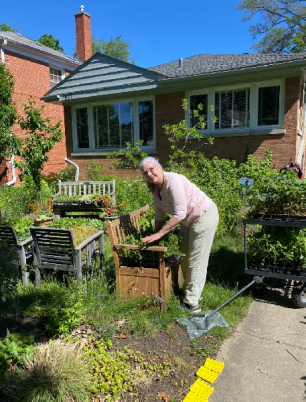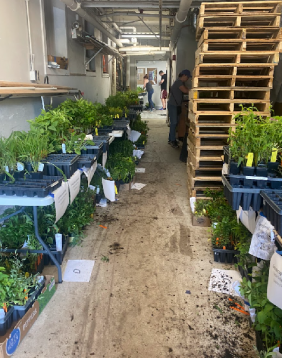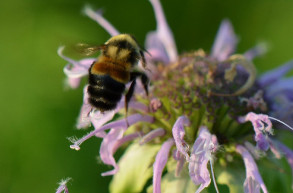Rooted in Community: How Spirited Gardener Brought a Native Plant Sale to North Shore
"Only if we understand, will we care. Only if we care, will we help. Only if we help shall all be saved." - Jane Goodall
 This month, we're considering the shift needed in how we view our landscapes, moving beyond the desire for "maintenance-free" to actively engaging with the native plants crucial for our climate. This isn't a burden, but an opportunity to connect with the living ecosystems that support us and a thriving natural world. Even invasive plants reflect nature's drive to protect the earth.
This month, we're considering the shift needed in how we view our landscapes, moving beyond the desire for "maintenance-free" to actively engaging with the native plants crucial for our climate. This isn't a burden, but an opportunity to connect with the living ecosystems that support us and a thriving natural world. Even invasive plants reflect nature's drive to protect the earth.
Spirited Gardener and the EEA Native Plant Sale
For Spirited Gardener's owner, Julia Bunn, this engagement extends to her volunteer work. Five years ago, she partnered with the Evanston Environmental Association (EEA) and Natural Habitat Evanston to launch a native plant sale in Evanston, aiming to increase local access to these vital plants. The initiative has flourished, providing over 2,900 plants and 150 shrubs for private and public gardens last year alone!
The Birth of a Community Initiative
In 2020, amidst the pandemic, Julia, in collaboration with Leslie Shad from Natural Habitat Evanston and dedicated volunteers, envisioned an Evanston rich with native plants to support our regional ecosystem’s diversity. Over the past five years, the plant selection has been refined based on community demand, with more shade-loving options added. The tireless efforts of EEA board members and volunteers have streamlined the sale's logistics, leading to impressive growth from over 1,500 plants sold in 2021 to over 3,000 in 2024!
leading to impressive growth from over 1,500 plants sold in 2021 to over 3,000 in 2024! These sales directly benefit the Evanston Ecology Center, supporting their vital programs, summer camps, and scholarships. Furthermore, unsold plants are generously donated to Evanston's community parks and gardens, such as Clark Street Beach Bird Sanctuary and Lovelace Park. Keep an eye out for these native additions!
These sales directly benefit the Evanston Ecology Center, supporting their vital programs, summer camps, and scholarships. Furthermore, unsold plants are generously donated to Evanston's community parks and gardens, such as Clark Street Beach Bird Sanctuary and Lovelace Park. Keep an eye out for these native additions!
Community Work is Important
Organizing the plant sale during peak gardening season is demanding, but the passion of volunteers and the community makes it incredibly rewarding. Witnessing Evanston's embrace of native plants is truly inspiring.
We invite you to join this ongoing journey to protect and restore our local ecosystem. Plant native in your own space, share your knowledge, volunteer locally, and spread the word.
Eco(fun) Fact - Plant Native, Support Endangered Species - Rusty Patched Bumble Bee
Did you know that the Rusty Patched Bumble Bee (Bombus affinis) is a native resident right here in the Chicago region? These industrious insects were once a common sight, buzz- pollinate from flower to flower across our prairies and gardens. Their unique pollen-collecting skills (read more about buzz pollination here) make them incredibly efficient pollinators for a wide variety of native plants, as well as many of the fruits and vegetables we rely on.
unique pollen-collecting skills (read more about buzz pollination here) make them incredibly efficient pollinators for a wide variety of native plants, as well as many of the fruits and vegetables we rely on.
This once-familiar bee is now federally endangered. Planting native plants is crucial for its survival, providing the essential pollen and nectar it needs throughout its life cycle. Creating diverse native wildflower, grass, and tree habitats offers continuous food sources from spring to fall. Notably, the EEA plant sale specifically highlights plants that support the Rusty Patched Bumble Bee with an "RPBB" designation. One of the plants we offer, Turtlehead (Chelone glabra) even provides nectar that contains compounds that can help bumblebees fight off parasitic infections.
By choosing native plants for our gardens, we can directly contribute to the recovery of this endangered local pollinator and ensure a buzzier, more biodiverse future for Chicago and the surrounding areas.
More information: Bombus affinis (Rusty Patched Bumble Bee); Evanston Host Plant Initiative | Natural Habitat Evanston; Photo credit: Natural Habitat Evanston
EXTRA Eco(fun) Fact - Invasive Plants and Ticks
We introduced you to the invasive species barberry in a past blog. Originally introduced for ornamental purposes, these shade-tolerant plants outcompete native vegetation and disrupt local ecosystems. To make matters worse, recent research has uncovered a concerning link between dense barberry infestations and elevated tick populations, including the deer tick, which is a primary vector for Lyme disease.
 Effective identification and management of non-native barberry are therefore critical for both ecological preservation and public health. These shrubs create microhabitats that favor tick survival and increase tick-to-host contact. This is especially bad out in first preserves, so always check yourself and your dogs after you go on a hike.Control methods range from manual removal of young plants to targeted herbicide applications for larger infestations, emphasizing the importance of early detection and consistent follow-up to prevent regrowth and further spread. Watch out for barberry in your yard and consider helping with an ecological stewardship day at your local forest preserve.
Effective identification and management of non-native barberry are therefore critical for both ecological preservation and public health. These shrubs create microhabitats that favor tick survival and increase tick-to-host contact. This is especially bad out in first preserves, so always check yourself and your dogs after you go on a hike.Control methods range from manual removal of young plants to targeted herbicide applications for larger infestations, emphasizing the importance of early detection and consistent follow-up to prevent regrowth and further spread. Watch out for barberry in your yard and consider helping with an ecological stewardship day at your local forest preserve.
Photo by Nikola Tomašić on Unsplash
 May 14, 2025 by
May 14, 2025 by
 This month, we're considering the shift needed in how we view our landscapes, moving beyond the desire for "maintenance-free" to actively engaging with the native plants crucial for our climate. This isn't a burden, but an opportunity to connect with the living ecosystems that support us and a thriving natural world. Even invasive plants reflect nature's drive to protect the earth.
This month, we're considering the shift needed in how we view our landscapes, moving beyond the desire for "maintenance-free" to actively engaging with the native plants crucial for our climate. This isn't a burden, but an opportunity to connect with the living ecosystems that support us and a thriving natural world. Even invasive plants reflect nature's drive to protect the earth.Spirited Gardener and the EEA Native Plant Sale
For Spirited Gardener's owner, Julia Bunn, this engagement extends to her volunteer work. Five years ago, she partnered with the Evanston Environmental Association (EEA) and Natural Habitat Evanston to launch a native plant sale in Evanston, aiming to increase local access to these vital plants. The initiative has flourished, providing over 2,900 plants and 150 shrubs for private and public gardens last year alone!
The Birth of a Community Initiative
In 2020, amidst the pandemic, Julia, in collaboration with Leslie Shad from Natural Habitat Evanston and dedicated volunteers, envisioned an Evanston rich with native plants to support our regional ecosystem’s diversity. Over the past five years, the plant selection has been refined based on community demand, with more shade-loving options added. The tireless efforts of EEA board members and volunteers have streamlined the sale's logistics,
 leading to impressive growth from over 1,500 plants sold in 2021 to over 3,000 in 2024!
leading to impressive growth from over 1,500 plants sold in 2021 to over 3,000 in 2024! These sales directly benefit the Evanston Ecology Center, supporting their vital programs, summer camps, and scholarships. Furthermore, unsold plants are generously donated to Evanston's community parks and gardens, such as Clark Street Beach Bird Sanctuary and Lovelace Park. Keep an eye out for these native additions!
These sales directly benefit the Evanston Ecology Center, supporting their vital programs, summer camps, and scholarships. Furthermore, unsold plants are generously donated to Evanston's community parks and gardens, such as Clark Street Beach Bird Sanctuary and Lovelace Park. Keep an eye out for these native additions!Community Work is Important
Organizing the plant sale during peak gardening season is demanding, but the passion of volunteers and the community makes it incredibly rewarding. Witnessing Evanston's embrace of native plants is truly inspiring.
We invite you to join this ongoing journey to protect and restore our local ecosystem. Plant native in your own space, share your knowledge, volunteer locally, and spread the word.
Eco(fun) Fact - Plant Native, Support Endangered Species - Rusty Patched Bumble Bee
Did you know that the Rusty Patched Bumble Bee (Bombus affinis) is a native resident right here in the Chicago region? These industrious insects were once a common sight, buzz- pollinate from flower to flower across our prairies and gardens. Their
 unique pollen-collecting skills (read more about buzz pollination here) make them incredibly efficient pollinators for a wide variety of native plants, as well as many of the fruits and vegetables we rely on.
unique pollen-collecting skills (read more about buzz pollination here) make them incredibly efficient pollinators for a wide variety of native plants, as well as many of the fruits and vegetables we rely on.This once-familiar bee is now federally endangered. Planting native plants is crucial for its survival, providing the essential pollen and nectar it needs throughout its life cycle. Creating diverse native wildflower, grass, and tree habitats offers continuous food sources from spring to fall. Notably, the EEA plant sale specifically highlights plants that support the Rusty Patched Bumble Bee with an "RPBB" designation. One of the plants we offer, Turtlehead (Chelone glabra) even provides nectar that contains compounds that can help bumblebees fight off parasitic infections.
By choosing native plants for our gardens, we can directly contribute to the recovery of this endangered local pollinator and ensure a buzzier, more biodiverse future for Chicago and the surrounding areas.
More information: Bombus affinis (Rusty Patched Bumble Bee); Evanston Host Plant Initiative | Natural Habitat Evanston; Photo credit: Natural Habitat Evanston
EXTRA Eco(fun) Fact - Invasive Plants and Ticks
We introduced you to the invasive species barberry in a past blog. Originally introduced for ornamental purposes, these shade-tolerant plants outcompete native vegetation and disrupt local ecosystems. To make matters worse, recent research has uncovered a concerning link between dense barberry infestations and elevated tick populations, including the deer tick, which is a primary vector for Lyme disease.
 Effective identification and management of non-native barberry are therefore critical for both ecological preservation and public health. These shrubs create microhabitats that favor tick survival and increase tick-to-host contact. This is especially bad out in first preserves, so always check yourself and your dogs after you go on a hike.Control methods range from manual removal of young plants to targeted herbicide applications for larger infestations, emphasizing the importance of early detection and consistent follow-up to prevent regrowth and further spread. Watch out for barberry in your yard and consider helping with an ecological stewardship day at your local forest preserve.
Effective identification and management of non-native barberry are therefore critical for both ecological preservation and public health. These shrubs create microhabitats that favor tick survival and increase tick-to-host contact. This is especially bad out in first preserves, so always check yourself and your dogs after you go on a hike.Control methods range from manual removal of young plants to targeted herbicide applications for larger infestations, emphasizing the importance of early detection and consistent follow-up to prevent regrowth and further spread. Watch out for barberry in your yard and consider helping with an ecological stewardship day at your local forest preserve.Photo by Nikola Tomašić on Unsplash




